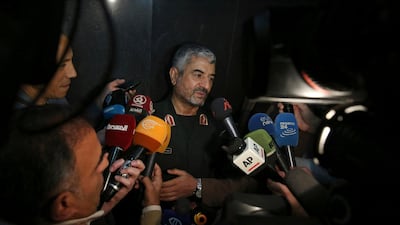Iran has no plans to extend the range of its missiles because their 2,000-kilometre reach is enough to protect the country, the Revolutionary Guards commander said on Tuesday, amid mounting US pressure over Tehran's missile programme.
Iran's government again ruled out negotiations with US President Donald Trump over Tehran's military capabilities and regional influence, saying that such talks would be against the values of the country.
Last month, Mr Trump withdrew the United States from the 2015 accord between Iran and world powers that curbed Tehran's nuclear activity in exchange for sanctions relief.
He said the deal was deeply flawed because it had not curbed Iran's ballistic-missile programme or reined in its support for proxies in conflicts in Syria, Iraq and Yemen, and said Washington would reimpose tough sanctions on Tehran.
"We have the scientific ability to increase our missile range, but it is not our current policy since most of the enemies' strategic targets are already within this 2,000km range. This range is enough to protect the Islamic Republic," Maj Gen Mohammad Ali Jafari was quoted as saying by Tasnim news agency.
______________
Read more
Iran nuclear deal countries meet in Tehran
Iran expands nuclear programme as Netanyahu meets Macron
Iran tells UN it will boost nuclear enrichment capacity
______________
Maj Gen Jafari said on Tuesday previous negotiations with the United States about Iran's nuclear programme were "an exception", and called Iranian politicians and activists who have favoured fresh talks with Mr Trump as "traitors and anti-revolutionaries".
On Saturday, more than 100 activists associated with the moderate and reformist camps in Iranian politics welcomed Mr Trump's deal with North Korean leader Kim Jong-un envisaging a complete denuclearisation of the Korean peninsula.
In a statement published by Iranian media, the activists urged Tehran to start direct negotiations with Washington "with no preconditions" to resolve decades of enmity between the two countries dating to Iran's 1979 Islamic Revolution.
Maj Gen Jafari rejected their call. "The North Korean leader was a revolutionary, but a communist, not an Islamic one. That is why he surrendered, but we will not do the same," he was quoted by the semi-official Fars news agency as saying.
Iranian government spokesman Mohammad Bagher Nobakht echoed Maj Gen Jafari's remarks. "There are no grounds or logic to talk to such a person [Trump]. Public opinion would not welcome that either," Mr Nobakht was quoted as saying by ISNA news agency.
Maj Gen Jafari said previously that the range of Iran's ballistic missiles was based on limits set by Supreme Leader Ayatollah Ali Khamenei, who commands the armed forces.

